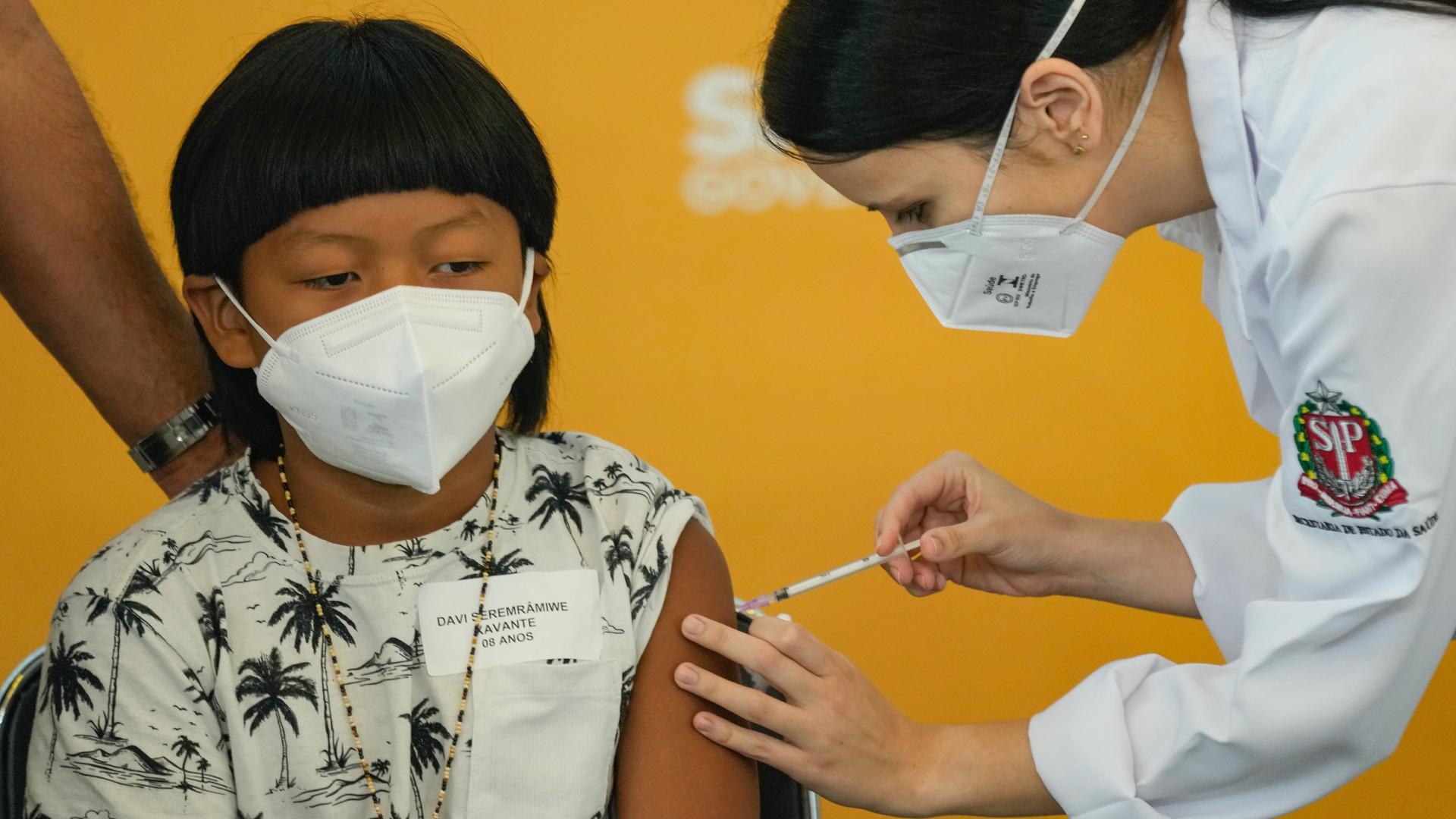A week and a half ago, 8-year-old Davi Seremramiwe Xavante became the first child in Brazil to be vaccinated.
In a video of the event, he’s shown taking the shot like a champ before a roomful of press representatives in São Paulo.
His father, Indigenous Xavante leader Jurandir Siridiwe, thanked those involved in the effort to fight the coronavirus in a message that he shared via Twitter: “May all of the children of Brazil be vaccinated.”
It’s significant that the first child to receive a shot in Brazil is Indigenous. Brazil’s health regulatory agency approved vaccines for children, aged 5 to 11, earlier in the month. Native Brazilians have been especially hard hit by omicron as fake news and denialism have weakened vaccination efforts.
Related: Brazil heads into latest COVID surge amid public health information blackout
Although vaccines are available, 1,258 Indigenous people have died from COVID-19 since the beginning of the pandemic, according to the country’s largest Indigenous association, APIB, many of them leaders and elders.
Last Saturday, under a clear blue sky, a group of adolescents lined up to be vaccinated on Xokleng Indigenous territory, in the hills of southern Brazil.
A group of five nurses administered the shots. which were welcomed, as the Xokleng have had a difficult time lately with the pandemic.
“In 2020, we practically only had one death. But in 2021 we lost a lot of youth. We lost a 22-year-old girl, a man of 50, someone who was 31 and his brother. And recently, a girl who was only 20. So, 2021 wasn’t very good for us, even though we had a vaccine.”
“In 2020, we practically only had one death,” said Xokleng leader Brasílio Priprá. ”But in 2021 we lost a lot of youth. We lost a 22-year-old girl, a man of 50, someone who was 31 and his brother. And recently, a girl who was only 20. So, 2021 wasn’t very good for us, even though we had a vaccine.”
The most recent death was just two weeks ago.
Related: Progressive evangelicals in Brazil wage a battle ‘against Bolsonaroism’ ahead of elections
“Generally, the people who died were the people who hadn’t been vaccinated,” Priprá said. “They weren’t vaccinated, and they got sick.”
It’s a similar story across the country as omicron has spread fast — along with the flu.
According to COIAB, the largest Indigenous organization of the Brazilian Amazon, 60% of the residents in some villages are fully vaccinated. That’s in part due to a stream of fake news and anti-vaccination messages that Indigenous people there have received, COIAB and other experts said.
In one video that has been shared widely over WhatsApp in recent days among the Kayapó people in the Brazilian Amazon, President Jair Bolsonaro said that the shot could cause chest pain and shortness of breath.
“Parents, you have to be conscious of your responsibility in vaccinating, or not vaccinating, your child,” he said. “I repeat, my daughter will not be vaccinated.”
In another WhatsApp video doing the rounds, a woman speaking in Portuguese tours an anti-vaccination event in the United States. She describes a row of pictures staked into the ground, which allegedly show people who have died from the vaccine. A sign in the background falsely claims, “The jab has killed more kids than [COVID-19].”
“Not even 50% of the Kayapó are vaccinated now, and there has been a lot of resistance,” said Cassuça Benevides, with the Kabu Institute, which represents the Kayapó people. “What arrives to the people here is largely fake news, videos over WhatsApp shared in groups. Many COVID-19 denialist videos.”
Related: ‘It’s a gigantic tragedy’: Flooding in Brazil’s Bahia state displaces tens of thousands
These videos are influential in many isolated communities where people get a lot of their information from social media and evangelical churches. Indigenous leaders, the Kabu Institute, and other Native groups say they have done their best to promote vaccines and respond to the misinformation — holding meetings, health education days and sharing information online.
Kayapó leader Doto Takak-Ire said he was able to convince those in his village to get vaccinated, and he hopes they can encourage other communities to follow their lead, using the vaccine alongside traditional medicine. But, he said, “People are afraid.”
“Some fake news says this vaccine has the mark of the beast, or it’s a thing of the devil,” Takak-Ire said. “So, those people who frequent the church got scared.”
Luiz Penha, a Tukano Indigenous leader with COIAB, blames the government for its lack of support, the slow vaccination campaign and for spreading misinformation that is costing people their lives.
According to reports, five members of the Kayapó people died from flulike symptoms just in the last two weeks.
“We can never have our family members back. Many family members, many leaders have been lost. The community misses them a lot. That’s really hard.”
“We can never have our family members back,” he said. “Many family members, many leaders have been lost. The community misses them a lot. That’s really hard.”
In August, Brazil’s Indigenous members of APIB denounced Bolsonaro before the International Criminal Court, holding the president responsible for Native deaths during the pandemic and for encouraging the invasion of their lands. Two months later, Brazil’s COVID-19 Senate investigation charged Bolsonaro with crimes against humanity for failing to adequately defend Indigenous lives during COVID-19.
Related: Electricity rates have skyrocketed in Brazil. The govt says the water crisis is to blame.
“The government treats Indigenous people like it always has. We are not a priority. There is huge prejudice and discrimination,” said Marcos Kaingang, a member of the Kaingang people who live on territory near Porto Alegre, the capital of Brazil’s southernmost state.
“Each new variant comes, but there is no support. We had delta. It hit Indigenous communities hard. And nothing was done. If it wasn’t for our organizing, things in the pandemic would have been worse because the government did very little.”
